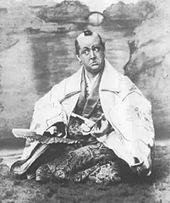
Grand Poobah is a satirical term derived from the name of the haughty character Pooh-Bah in Gilbert and Sullivan's The Mikado (1885).[1] In this comic opera, Pooh-Bah holds numerous exalted offices, including "First Lord of the Treasury, Lord Chief Justice, Commander-in-Chief, Lord High Admiral ... Archbishop ... Lord Mayor" and "Lord High Everything Else". The name has come to be used as a mocking title for someone self-important or locally high-ranking and who either exhibits an inflated self-regard or who has limited authority while taking impressive titles.[2] The American writer William Safire wrote that "everyone assumes [the name] Pooh-Bah merely comes from [W. S. Gilbert] combining the two negative exclamations Pooh! plus Bah!, typical put-downs from a typical bureaucrat."[3]
In popular culture
- The term "Grand Poobah" was used recurringly on the television show The Flintstones as the name of a high-ranking elected position in a secret society, the Loyal Order of Water Buffaloes. The main characters, Fred Flintstone and Barney Rubble, were members of the lodge. The lodge is a spoof of secret societies and men's clubs like the Freemasons, the Shriners, the Elks Club and the Moose Lodge.[4]
- The character Howard Cunningham on the TV series Happy Days was a Grand Poobah of Leopard Lodge No. 462 in Milwaukee.[5]
See also
References
- ^ This character was based, in part, on James Planché's Baron Factotum, the "Great-Grand-Lord-High-Everything" from The Sleeping Beauty in the Wood (1840). Williams (2010), p. 267
- ^ "Pooh-bah", Merriam-Webster Online Dictionary, accessed 14 June 2009
- ^ Safire, William. "Whence Poo-Bah", Safire's Political Dictionary, excerpted in GASBAG, Vol. 24, No. 3, issue 186, p. 28, January–February 1993
- ^ "Loyal Order of Water Buffalo", Grand Lodge Freemasonry site, 8 April 2004, accessed 14 September 2009
- ^ Holmes, Linda. "RIP Tom Bosley, One Of TV's Great Dads", National Public Radio, 19 October 2010, accessed 6 March 2018. See, e.g. episode #150, "Burlesque", aired 6 November 1979
Sources
- Williams, Carolyn (2010). Gilbert and Sullivan: Gender, Genre, Parody. New York: Columbia University Press. ISBN 0-231-14804-6.